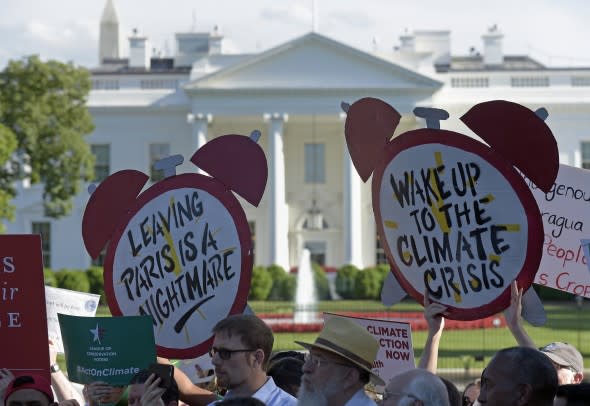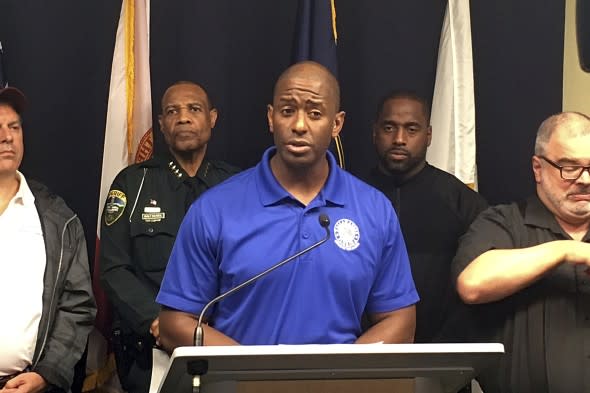Why climate change isn't being heavily discussed by Republicans, Democrats ahead of next month's midterm elections
Climate change continues to increasingly become a subject of debate in the United States, following another year of catastrophic wildfires burning in the West and devastating hurricanes in the East.
President Donald Trump removed the U.S. from the Paris climate agreement in June 2017, sparking a national debate and further dividing party lines. Meanwhile, scientists have been increasingly sounding the alarm about the dangers of a warming planet.
As the upcoming midterm elections get closer, the issue of climate change is not being heavily discussed among both Democrats and Republicans who are running for seats in the House and Senate. The vast majority of both Democratic and Republican candidates do not mention global warming in digital or TV ads, in their campaign literature or on social media.

Protesters gather outside the White House in Washington, Thursday, June 1, 2017, to protest President Donald Trump's decision to withdraw the Unites States from the Paris climate change accord. (AP Photo/Susan Walsh)
The absence of climate change in the midterm election campaigns reflects the highly polarizing nature of the issue. A new Pew Research Center survey shows that 72 percent of registered voters backing Democrats in the upcoming elections view climate change as a "very big" problem, compared to just 11 percent of Republican supporters.
This 61-point gap is tied for the largest among 18 topics Pew asked about in the survey that also addressed the justice system, economy, education, immigration and many other areas.
Dr. Mike Binder, Public Opinion Research Lab faculty director at the University of North Florida, explains why both Democratic and Republican candidates may avoid the subject when running for office this year.
"Republicans are not going to be talking about this because there's a large segment of the party that doesn't believe, thinks it's not a man-made issue, isn't concerned about it or those types of things," Binder said.
Republicans are not likely to talk about it with very few exceptions, whereas Democrats may bring up the issue with hesitation.
During this election cycle, Democrats are trying to take some of those toss-up districts, with some districts leaning Republican and many that voted for Trump. Therefore, climate change is not a winning issue in those districts.
"Climate change was talked about a great deal in the Democratic primaries and ironically, most people in the crowd in the primaries are all on board and fully supportive," Binder said.
For example, Tallahassee Mayor and Democratic Gubernatorial candidate Andrew Gillum talked about climate change more in the primaries than in his current campaign. This trend is common among many Democrats.
The issue doesn't play well in the general election because it's divisive. Therefore, Democrats are typically staying away from the subject.

Tallahassee Mayor and Democratic gubernatorial candidate Andrew Gillum speaks during a briefing on Hurricane Michael in Tallahassee on Wednesday Oct. 10. Gillum sounded much like the man he wants to replace, Gov. Rick Scott, who constantly urged residents to seek shelter and take the massive storm seriously. (AP Photo/Gary Fineout)
Climate change is also not discussed because it is not viewed as an immediate issue. While there have been stronger storms, it is hard to definitively associate one particular storm with climate change, according to Binder.
Therefore, the average voter might not care that much about climate change, as many voters might not view it as the most important problem facing the country.
While it is a higher priority on the left side of the electorate than the right side, it is still not a top priority.
If you're a Democrat trying to win a district traditionally won by Republicans, the last thing you want to do is talk about an issue that many of the voters don't think is a problem, Binder said.
Therefore, Democratic candidates will be speaking about healthcare, education or other issues that are more clear to the voters' everyday lives.
Some districts are unique in their approach to climate change. In districts experiencing impacts associated with climate change, candidates are more likely to speak of the issue.
For example, red tide is a growing problem in western Florida. Therefore, congressional candidates David Shapiro and Vern Buchanan in District 16 have addressed aspects of climate change in their campaign, such as the warming waters in the Gulf contributing to the algae blooms.
In cities like Miami that have been affected by rising sea levels, congressional candidates from those areas are more likely to speak more about climate change in their campaign, according to Binder.
